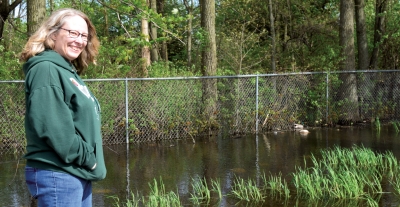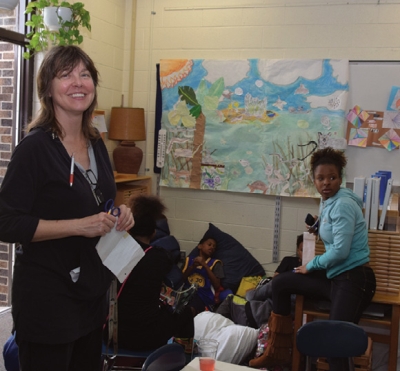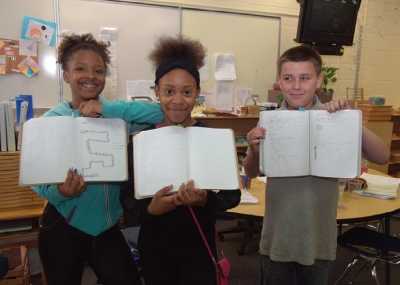The Grand Learning Network: Helping Teachers, Students, and Communities Care for Local Places
- Shari L. Dann
- Associate Professor
- Department of Community Sustainability
- College of Agriculture and Natural Resources

Shari Dann by the vernal pond at Wexford Montessori, Lansing.
At 260 miles, the Grand River is Michigan's longest river. Its major and minor tributaries, including the Red Cedar River, which flows through the MSU campus, offer ample opportunity for learning about Michigan's watersheds. Shari Dann serves as principal investigator for the GRAND (Grand River And Nature Discovery) Learning Network, one of nine hubs supported by the Great Lakes Stewardship Initiative. The initiative uses place-based education to give youth, teachers, and communities in Michigan opportunities to learn about and appreciate local natural resources. The GRAND Learning Network focuses its stewardship on the middle Grand River watershed region surrounding greater Lansing.
"Through place-based stewardship education," said Dann, "we come together and do all sorts of professional development, and we support networks and teacher leadership development. These Teacher Leaders then carry out educational experiences for their students that partner their schools with various communities. It gives an opportunity to use assets that are already here—assets that can be rejuvenated, lifted up, and celebrated to develop a sense of place."
Working with Local Schools

Teacher Kristen Small with her students during a nature activity.
Six school districts were selected to participate in the GRAND Learning Network (Lansing, Bath, Holt, Haslett, Dewitt, and Laingsburg), based on their location near headwater regions of the Grand River watershed and near the Middle Grand River.
Wexford Montessori Academy is a Lansing Public Schools K-8 magnet school located near the Grand River. Wexford's property contains several natural areas, including a woodlot and a vernal pond, and teacher Kristan Small uses these natural areas to involve her students in nature-based stewardship projects and experiences.
To get some ideas for their projects, she and her students visited several natural places on MSU's campus, such as the Baker Woodlot, the Landscape Arboretum, and the 4-H Children's Garden. Students took notes in their nature journals, so they could begin planning and mapping their projects. Sixth grader Derek Miller really enjoyed the Children's Garden. "It's fun! There's a lot of natural stuff for animals to live there and have a shelter," he said.
Small is enthusiastic about the opportunity to expand her students' appreciation for Michigan's resources. Even little moments make lasting impressions.
"The ‘Oh my gosh! It's so great!' moment happens when all of a sudden a frog jumps, and they gasp and stare, and that's their moment," said Small. "They may act like they don't remember or it's no big deal. But later I find it in their writing, so I know it's making an impression. As long as it's planting those kinds of platforms for what they'll seek later, we've done our work."
Dann works closely with Mark Stephens, education program coordinator of MSU's Project FISH (Friends Involved in Sportfishing Heritage), and Margaret Holtschlag, former K-12 educator and creator of the BIG Lesson Programs, to enlist, train, and support a cadre of community and educational partners throughout the Grand River Watershed area.
"The thing is, in order for kids to really appreciate nature, they have to experience it not just once but multiple times, and that's what we focus on. We try to give teachers as many opportunities to get the kids outdoors as possible," said Stephens. "Wexford is one of those schools. We did ice fishing with them; they did a wildlife planting a couple of times in Lansing, they've gone to Annie's BIG Nature Lesson for five years, and they have that backyard habitat that they're working on. So they're doing a lot of cool things over there."
Providing Hands-On Experiences

Wexford students Makayla Austin, Kai Nichols, and Derek Miller display their nature journals.
The team does a lot of hands-on training with teachers, coordinating activities and connecting them with community partners. For example, during a recent professional development institute, they took teachers on a bicycle tour of the River Trail in Lansing in which teachers learned about unique geologic formations, plant and animal life, and improvements by the City of Lansing for the betterment of the community. "We also did a rafting experience to see what the river looks like from the river—for example, the Red Cedar, where it connects to the Grand River and then all the way downtown," said Stephens. "Those are the kinds of things that give them a hands-on experience. The teachers take that back into the classroom and use that training. And if they're really excited, then we'll work with them to find people that will help them even more."
Holtschlag is the director of the BIG Lesson programs, an immersion learning experience that provides teachers and students with week-long, interdisciplinary study trips using community resources as their classroom. Formerly a K-12 educator in the Haslett School District, Holtschlag was recognized as Michigan's State Teacher of the Year in 1999 and was a finalist for National Teacher of the Year. Teachers in 13 cities across Michigan participate in her BIG Lesson programs, such as the BIG Zoo Lesson, BIG History Lesson, BIG Science Lesson, and Annie's BIG Nature Lesson. Some of the lessons are taught by experts in the community, such as Dr. Dann, which has helped connect the GRAND Learning Network with many mid-Michigan teachers and community partners.
"With the GRAND Learning Network, we have the wonderful opportunity to work with teachers who are already out there thinking about what they can do that enhances the current curriculum and helps their kids with being productive citizens as well," said Holtschlag. "This really is joyful work, because when we get to work with teachers, we know that we're making a difference with individual teachers who are already giving so much and who are so very dedicated to the field of education. But we also know that there's this wonderful ripple effect that happens...the good work of this goes far beyond just the nature experience or the stewardship project. The good work really goes into the future."
Scholarship and Training Enrich the Future of Watershed Education and Enjoyment
"Much of our foundational professional development now is taught by some of these Teacher Leaders," said Dann. "So they will actually teach the lessons—for example, what is a vernal pond? And here's how you can do stewardship around it. They desperately want to advance education, so this gives them a positive outlet to do that, that's community engaged."
The scholarship underpinning the work of the GRAND Learning Network has been shared in many research- and practice-oriented venues. According to Dann, presentations made at the North American Association for Environmental Education have focused on the use of reflection in stewardship and place-based education, as well as on the scholarship supporting the development of Teacher Leaders. In addition, Dr. Dann regularly describes the GRAND Learning Network as part of University Outreach and Engagement's Graduate Certification in Community Engagement. Kristan Small and Cammie Jones, a colleague from DeWitt, have also authored scholarly case studies for publication highlighting the key tenets of engaged scholarship for watershed stewardship involving students.
"This work of the partnering co-leaders—myself, Margaret Holtschlag, and Mark Stephens—and the diverse communities engaged in long-term meaningful partnerships that generate stewardship—all of this scholarly approach has greatly enriched place-based education in the watershed," said Dann.
"Throughout all of the work that we do," she said, "we use an assets-based approach to place-based education and community engagement. The big vision is about community appreciation, that there are these treasures right here that the students, neighbors, and neighboring partners can lift up as wonderful assets."
- Written by Amy Byle, University Outreach and Engagement